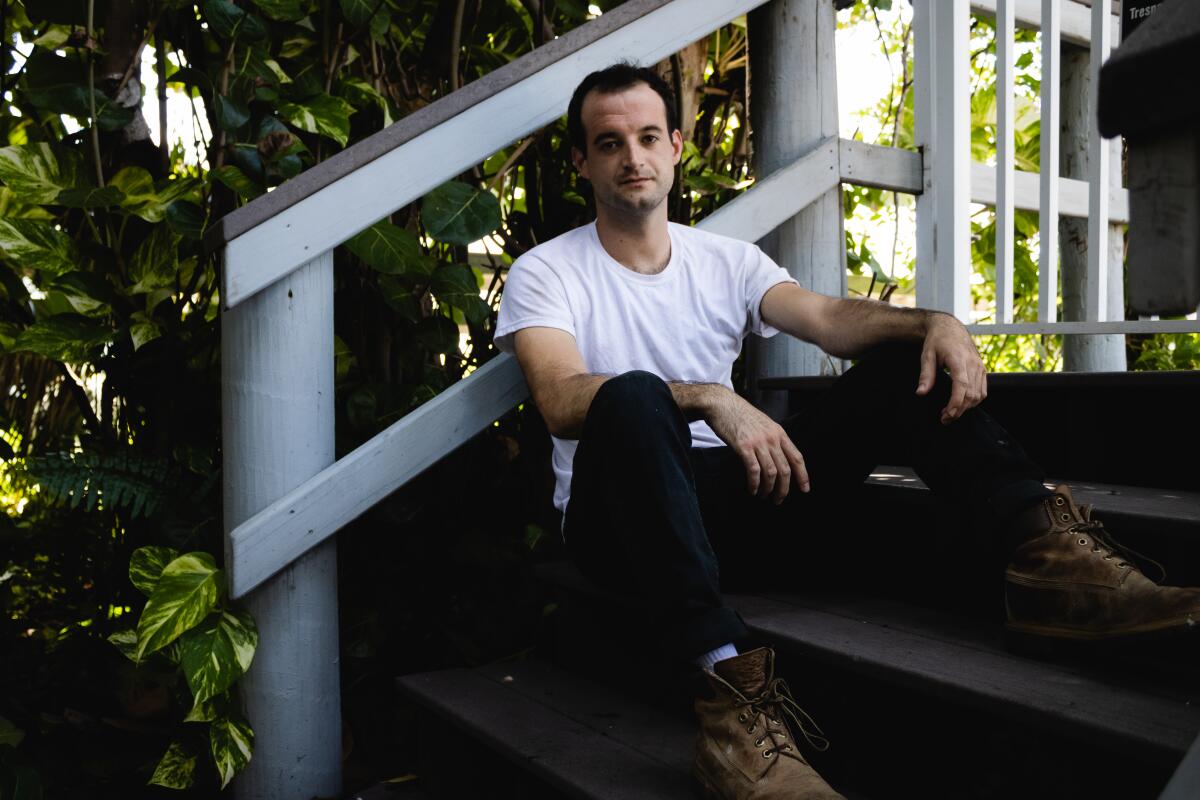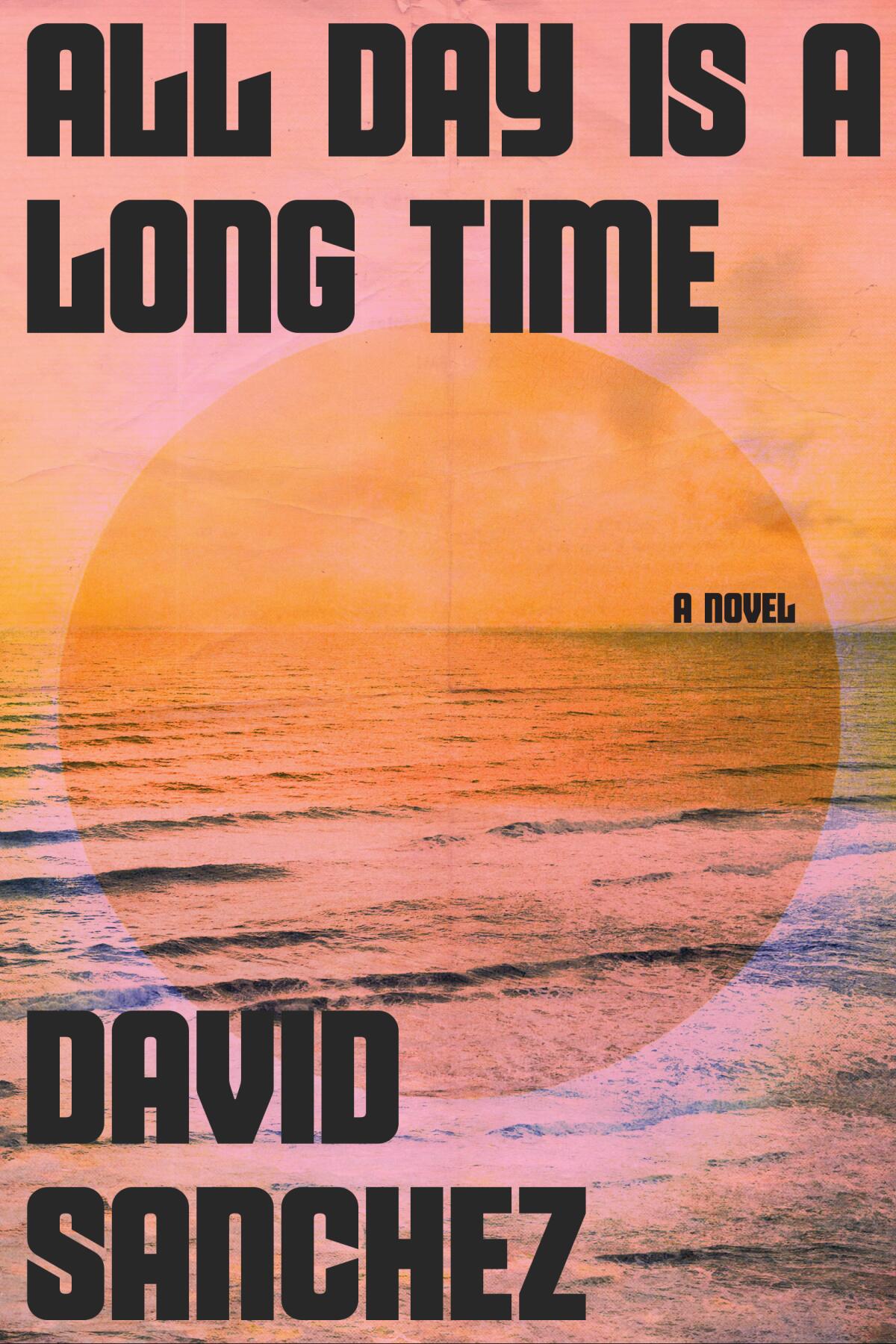Think you’re tired of addiction stories? Read this new novel and think again

- Share via
On the Shelf
'All Day Is a Long Time'
By David Sanchez
Harper: 256 pages, $26
If you buy books linked on our site, The Times may earn a commission from Bookshop.org, whose fees support independent bookstores.
There’s a moment in “All Day Is a Long Time,” the new novel by David Sanchez, when the precocious but doomed teen at its center — also named David Sanchez — is out of his mind on drugs in a high school art class, where he thinks he’s filling the page with an enormous drawing of an elephant.
In reality, he has drawn a very small elephant, and somehow the elephant looks deeply sad, and the teacher tacks it up for the whole class to admire. “She thinks I did it on purpose,” Sanchez tells his girlfriend later. “But really I was just f—ed up.” His baffled reaction helps communicate the animating tension in a daring and winning debut — a very pleasant surprise for a story that you worry at first might be a Florida retread of “A Million Little Pieces.”
One way to weigh a book like this (Drugs! Depravity! Redemption?) is: What can we learn? What images or ideas are of use? Because the myth of the smart junkie is maybe not a story we all still care about. What is the unique narrative tension here? What is edifying about this version of a hero’s journey?
The early images are strong. In his first hit, taken on a ratty couch in a mobile home by the Gulf, Sanchez “lived the whole rest of my life — decades of misery and haste, ecstasy and boredom; only to be born again, live exactly fourteen more years and find myself unchanged back on that couch. … I spent all my money and it reappeared and I spent it again. … I taste the oil of every cheap meth shot I’ll ever do. … Shotguns and AR-15s, steaks and mean dogs, my shaking hand pointing a needle at a pair of boat shoes. I see bookcases falling over and lizards in the prehistoric jungle eating Snickers bars, unrolling lithium batteries with their claws.”
In Lauren Groff’s second story collection, the dark and engrossing “Florida,” the title state is almost always home to bad news.
Chapters unfurl, and the details somehow remain engrossing. “Everyone knows that meth [messes] up your teeth,” Sanchez offers. But it isn’t the meth that rots them out. “It’s not candy. The meth just makes you stop producing saliva. Spit helps kill germs and bacteria in the mouth, so without it your gums and your teeth fester.” Spit is disgusting, Sanchez concedes, but “like many things, the alternative is worse.”
Why get wrecked? The common answers: running from something, raised wrong, bad genes, no willpower, oversensitivity, delicate genius, the ugliness of the world. “These are all flimsy excuses,” Sanchez admits. What would a good one be?
From high school to jail to rehab and then back to jail, a decade in Florida offers a kind of answer — and also some of the best writing about the state this native has seen in many years. There’s poetry in the way our hero talks, for instance, about the wrestling tournaments he can just barely make before he quits: “One match you’d be wrestling some river rat from Palatka or a rabbit-chaser from a trailer in Clewiston, and then next you’d have some corner kid from North Miami who only knew street noise, was probably scared of cicadas or the rustling of leaves. You’d bump up against some fancy kid from the Palm Beach country clubs who had a summer internship, or the son of a strawberry picker in Ruskin.”

But the tender heart of the book is literature — namely its capacity to save us, its utility even for the meanest meth head. One passage might double as an especially erudite BuzzFeed list for junkies: “Read Dante, read ‘Moby Dick’ while you’re high, get lost in the chapters that luxuriate on the different kinds of rope and how to tie knots. Read ‘Notes From Underground,’ Ellison’s ‘Invisible Man’ if you are withdrawing. ‘The Waves’ or Faulkner if you haven’t slept in a few days. Mostly, don’t go north of 1950. Stay away from the Beatniks — they don’t know what the f— they’re talking about. And memoirs are whiny.”
He’s trying to step clear of ‘A Million Little Pieces’ as he publicizes his novel.
Books, Sanchez argues, are as powerful as any controlled substance — just time-released jolts of information — and in their own way are just as radically simple: “There’s two parts: the white part and the black part. Read the black part.”
Why do we have patience for this kind of man, his story, his special journey? Partly it’s because writing like this is a passport to a different country: different rules, different business hours, different food and horizons. It’s dark but awfully appealing. We run toward it, then slow for the crash, wondering who will die and how. Another reason books like this continue to work is the clear agony of the “messenger,” a mix of compulsion and duty to share the journey, the depravity, the possibility of redemption.
Maybe you drink too much? Maybe it’s a loved one who is the problem user. Is this book going to help? You’ll like this guy. You want him to go home, clean up, read books because he wants to, not because he needs to. What’s so clarifying about “All Day Is a Long Time” is how it asks us to think about what any of us really needs in the end.
Facing a judge, the narrator pledges to stay clean. “I reached down to that bottommost part of my stomach, where I stored all my truest sentiments, where I held the things I meant and believed. … I did mean it, and I believed it, and I wanted nothing more than for it to be true.”
David Sanchez lived a lifetime before he went sober at 20. He describes the frantic and healing process of pouring it out into ‘All Day Is a Long Time.’
More to Read
Sign up for our Book Club newsletter
Get the latest news, events and more from the Los Angeles Times Book Club, and help us get L.A. reading and talking.
You may occasionally receive promotional content from the Los Angeles Times.











